»
How does the intestine hurt? What are the symptoms in women?
For lesions of the small or large intestine, a characteristic manifestation is a pain syndrome, in which a spasm occurs due to exposure to toxins or a damaging factor. Lactic acid accumulates in the cells, affecting the nerve endings and provoking pain.
Causes of pain in the intestines in women
The most common causes of pain in the intestines in women are inflammation of the intestinal mucosa, when, due to autoimmune processes or infection, isolated or thick (colitis) occurs. The appendix (appendicitis) or the sigmoid colon (sigmoiditis) can also undergo an inflammatory process.
As for autoimmune diseases, they develop due to a malfunction in the function immune system when antibodies against colon tissues are produced and develops.
It should also be noted that occur during pregnancy, when the growing uterus compresses the intestinal loops.
Other causes of pain in the intestines include blockage of the arteries supplying the intestines with a clot (mesenteric thrombosis), intestinal obstruction.
Symptoms of pain in the intestines
The nature, duration and localization of the source of pain in a woman can suggest the correct decision when making a diagnosis. For example, with pain coming from the right below, and urgently call ambulance. If pain in the intestines is felt below and on the left, this may be inflammation of the sigmoid colon, and pain at the navel, this is a sign of enteritis - inflammation of the small intestine. When all sections of the intestine become inflamed and the pain covers the entire abdomen, they speak of enterocolitis.
The nature of the pain in the female intestines can also be different. Intense acute pain is characteristic of non-specific ulcerative colitis and appendicitis, and aching and dull pain manifests itself in chronic flaccid inflammation of various parts of the intestine. For spasms of the intestinal walls, when exposed to mechanical factors or toxins, cramping pains are characteristic.
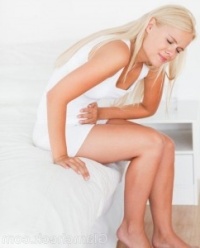
Pain can also vary in duration. In acute poisoning, appendicitis, intestinal infection, acute short-term pain occurs, and prolonged pain is more common in intestinal dysbiosis, ulcerative non-specific colitis, irritable bowel syndrome.
If the pain begins after eating, a lack of production of digestive enzymes can be suspected.
Often, abdominal pain in women is not associated with any disease. They can occur as a result of eating irritating intestines, peristalsis disorders, prolonged fasting, and the use of a number of drugs.
Intestinal pain in women differs from pain in the stomach in the absence of a direct relationship between food intake and the appearance of pain. True, if there are problems in the place of the transverse section of the colon, intestinal pain occurs immediately after eating, since the load of the bottom of the stomach on the intestines increases.
Acute pain in the intestines should not be repaid with painkillers; urgent medical help is needed here. It will not be possible to independently diagnose a number of conditions associated with these pains, which include acute appendicitis, renal colic when moving a stone through the ureter, peritonitis, strangulated hernia, perforation of the stomach or intestines.
If there is confidence that it is the intestines that are to blame for the occurrence of pain, and at the same time the pain allows you to move freely, use an antispasmodic drug, lie down and take a comfortable position, lie still for about half an hour. If the pain does not disappear, try gently massaging the stomach, and if swelling is observed, use one tablet per ten kilograms of weight. You can limit yourself to taking two sachets of Smecta. Drink at least eight glasses of drinking water daily, watch your diet, do not eat irritating food. Perform exercises that help restore normal intestinal motility.
The intestine is part of the gastrointestinal tract and is located in the human abdominal cavity. The intestine consists of the large and small intestines.
Pain in the intestines
Probably everyone knows how the intestines hurt. However, pain in the intestines are different:
- cramping,
- aching,
- stabbing,
- burning,
- pulling.
These pains are often accompanied by spasms. The pain may subside in a certain position or intensify with coughing, movement. After emptying the rectum comes relief. Bloating indicates the accumulation of gases in the intestines and violation of peristalsis, the occurrence of constipation.
When the intestines hurt in the lower abdomen, this can signal serious diseases in the intestines or in the organs of the peritoneum. These diseases can be: inflammation of the appendix, ulcers, hepatic and renal colic, inflammation in the kidneys, kidney stones, hernia, inflammation or enlargement of the sigmoid colon. In women, it can be acute inflammatory processes of the reproductive organs.
Pain in the lower abdomen can occur with intestinal obstruction, volvulus. In men, pain in the lower abdomen can be with urinary retention, with problems of the prostate gland.
What to do with pain in the intestines
When the intestines hurt, unfortunately, not everyone knows what to do. Sometimes it is enough to make small changes in the diet.
- You should eat more fiber, which softens and increases the volume of the contents of the intestine and promotes bowel movements. Bran porridge, cereal bread, baked potatoes, peas. However, with abundant intake of fiber, flatulence and bloating can occur.
- You can use nutritional supplements that are effective in the work of the gastrointestinal tract, constipation and diarrhea.
- It is necessary to use pectin, which is found in oranges, papaya, grapefruit. Pectin can help when the intestines in the lower abdomen hurt.
- Water helps move food through the intestines, it is better to drink six to eight glasses a day.
- Do not abuse caffeine, which stimulates peristalsis, accelerating bowel movements. Caffeine is found not only in coffee, but also in tea, chocolate, and cola drinks.
- It is necessary to minimize dairy products and wheat, which are poorly tolerated by irritable intestines.
- Be sure to move more, as exercise (swimming, running, walking) helps to move the digested food.
- And, of course, you must definitely calm down, as stress provokes an exacerbation of the gastrointestinal tract.
- Laxatives should be taken in moderation. You can’t use laxatives all the time, they need to be changed.
Causes of bowel disease
When the intestine hurts, the causes may be the following:
Pain in the intestines is not always associated with the disease. They can occur during prolonged fasting, when taking irritating food, and also when using certain medicines, with a disorder of peristalsis.
When peristalsis does not work, problems begin: the intestines hurt. Symptoms of this constipation problem include:
- dizziness, headache attacks,
- bad breath,
- apathy, drowsiness,
- isolation or vice versa irritability,
- decreased appetite,
- coated tongue.
Abdominal pain during pregnancy
During pregnancy, the belly becomes future mother the object of close attention. Any discomfort in the lower abdomen leads the pregnant woman to panic. The intestines hurt during pregnancy, or these are already problems associated with the threat of termination of pregnancy can be understood by visiting an obstetrician.
Abdominal pain in a pregnant woman can be divided into two types: obstetric and non-obstetric.
- Obstetrics:
- threatened miscarriage,
- ectopic pregnancy,
- placental abruption.
- Non-obstetric:
- digestive problems,
- stretching of the ligaments and muscles of the abdomen,
- displacement of internal organs,
- acute surgical pathology.
With the threat of termination of pregnancy in the lower abdomen, there are pulling or aching pains, or pains in the lumbar region, spotting appears. With an ectopic pregnancy, severe cramping pains occur, until loss of consciousness. There may be short-term pain with small bleeding. Fallopian tube rupture occurs at 8-12 weeks. With premature detachment of the placenta, severe abdominal pain occurs, signs of internal bleeding, intrauterine hypoxia appear.
During pregnancy, hormonal changes occur, and constipation, dysbacteriosis, and bloating may occur. Due to the growing uterus, the pelvic organs are displaced and abdominal pain occurs. Pregnant women may experience intestinal obstruction, appendicitis, pancreatitis, and so on.
Often people are faced with the problem of frequent pain in the intestines, they occur due to mucous colitis. The intestines collide with fermentation, the stomach begins to swell very strongly. He may suffer from diarrhea or constipation. The pain can be given to the stomach, while gases are tormented due to the fact that they accumulate in the intestines. Frequent pain in the intestines can spoil the important things of people. It is very difficult to find the cause of the pain. Because there are many of them, most likely this is due to nutrition or emotional overstrain.
Causes of frequent pain in the intestines
1. Due to the accumulation of gases in the intestines (flatulence), it occurs when, appears when a tumor occurs in the intestines, with irritation of the intestines.
2. Due to intestinal colic, the pain has a cramping character, smooth muscles begin to contract, which covers the walls of the small and large intestines. Pain occurs due to the fact that there is a spasm, colitis, food poisoning.
3. Due to intestinal obstruction, pain begins to occur due to the fact that the muscles in the intestine are stretched, the pain is accompanied by seizures.
4. Due to adhesive disease, adhesions form in the intestines, most often after abdominal abdominal surgery.
5. There may be pain in the intestines due to. At the same time, nausea appears, the temperature rises.
What to do if the intestine hurts?
1. Doctors relieve excruciating and frequent pain in the intestines with a balanced diet.
2. It is also advised to be careful with laxatives. If a person wakes up with abdominal pain, while it is accompanied by constipation, you can take a laxative, but you can not use them constantly. Because everything can develop into a chronic form, the intestines can become lazy and will not be able to fully work without medicines. That is why it is so important to use only natural remedies in the treatment.
3. It is very important to consume as much fiber as possible - a fibrous food substance. With the help of fiber, you can increase the volume of food in the intestines, and most importantly, soften it. When they occur, fiber helps to empty the intestines faster.
4. What foods are rich in fiber? A sandwich with grain bread for lunch, eat baked potatoes, for dinner you can eat some peas and. For breakfast great option is porridge with bran.
5. Help to cope with frequent pain in the intestines and nutritional supplements. Remember that if you abuse foods with fiber, bloating and flatulence can occur. Best to include in your diet food supplement with fiber - methyl cellulose preparation, fibogel husk preparation. In pharmacies you can find microcrystalline ankir-B.
6. In cases of frequent intestinal pain, you need to take enzyme preparations - panzinorm, festal,. With the help of them, you can soften dry and thicken liquid stools, therefore they are suitable for both constipation and constipation.
One of the most common causes of abdominal pain and bloating is dysbacteriosis. To effectively get rid of pain, its treatment should always work in two directions: firstly, it is necessary to eliminate the symptoms, and secondly, to restore and maintain the balance of the intestinal microflora. Among the funds that have two of these actions at once, Redugaz is distinguished. Simethicone - one of the components contained in the composition, fights abdominal discomfort and gently releases the intestines from gas bubbles, weakening their surface tension throughout the intestines. digestion. Inulin inhibits the growth of bacteria that cause gas, so re-bloating does not occur. Also of the pluses, it can be noted that the product is available in a convenient form in the form of chewable tablets and has a pleasant mint taste.
7. Consume as much as you can more water in a double dose. With the help of water, food moves faster, while the volume of emptying increases. It is best to drink up to 8 glasses of water per day. You can't just drink food with it.
8. Use as little as possible. Avoid caffeine as much as possible, it promotes bowel movements. But you will have to give up not only coffee, but tea, cola, chocolate.
9. It is very important to enter a food diary, write down everything that negatively affects your intestines, so it will be easier to find the cause. Remember that the food that you ate an hour ago is not always the cause of the pain, the reaction can be only after a few hours.
10. In no case should you eat a lot of wheat and dairy products. With an irritable bowel, such products negatively affect overall health. You also need to consider that milk and wheat are included in semi-finished products, already finished products. That is why it is so important to carefully study the composition of the products.
11. Try to eat only homemade food, for some people, food bought on the street can cause poisoning and upset. Perhaps this is due to additives, seasonings that are present in food.
12. Try to move as much as possible. Physical exercise will help normalize the intestines, they promote food that is digested. Be sure to choose a sports activity - walking, swimming, running. Try to train up to three times a week, if necessary, up to five.
13. Try not to be exposed to a stressful situation, it is because of this that frequent pains in the intestines can occur, find a way for yourself to relax.
Treatment of frequent pain in the intestines by a doctor
In cases of severe failure in your intestines, you need to urgently contact a specialist. If you began to suffer from constipation, diarrhea, abdominal pain appeared, which begins to worsen, and disappears only immediately after a bowel movement, most likely you have a problem - irritable bowel.
It is very important to pay attention to such symptoms:
2. We lost a lot of weight.
3. At night, diarrhea is especially severe.
4. A person has constipation or diarrhea, abdominal pain, which prevents them from working normally and living a full life.
With all these symptoms, it is very important to seek medical help in time.
So, frequent pain in the intestines, as a rule, occurs due to malnutrition or abuse. harmful products. Pain in the intestines can occur due to serious diseases that require urgent treatment. That is why it is so important to review your diet, to introduce as much as possible more products with fiber, drink as much water as possible, play sports, enter an active lifestyle, then you will not be disturbed by intestinal problems. In cases where the pain in the intestines began to worsen, you need urgent hospitalization.
The pain that the large intestine lends itself to appears for various reasons. If you are worried about bloating, stool disturbance and other painful symptoms, you should immediately consult a doctor to avoid complications. The large intestine is the end of the digestive tract. With a disease of this internal organ, the entire digestive system the body stops absorbing essential vitamins, glucose, water and others useful material. As a result, a person feels pain either on the right or on the left, and sometimes painful sensations simply do not give rest and cover the entire body. And it also happens that after a long time the symptoms do not appear in any way, and the disease continues to progress.
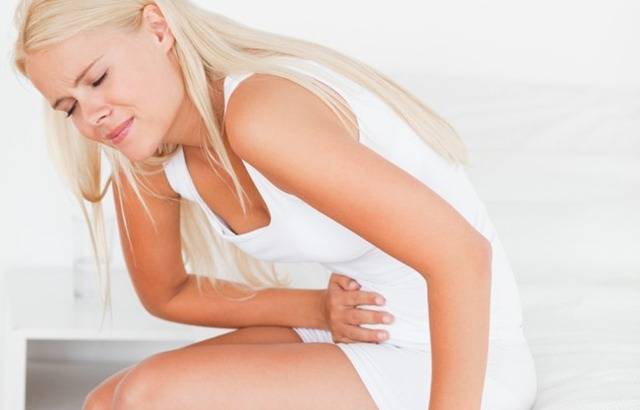
At first, having felt, a person does not immediately wonder why they arise. And only over time, with an exacerbation of the disease, he turns to a specialist. You should contact your doctor immediately if you experience any of the following symptoms:
- bloating or rumbling of the abdomen;
- violation of the stool (diarrhea alternates with constipation);
- bloody, mucous or purulent impurities in the feces.
These symptoms appear in the intestinal area for completely different reasons, they may disappear over time, but this can only indicate the progression of the disease. In case of serious diseases, self-treatment is dangerous, it is necessary to pass tests and consult a specialist.
Appendicitis
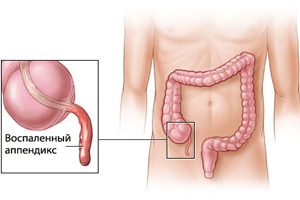 The acute form of the disease is treated only by surgery.
The acute form of the disease is treated only by surgery. Appendicitis - inflammation of the appendix, an appendage of the rectum, located on the right. This pathology is not uncommon and requires urgent surgery. With this ailment, a person hurts most often on the right, but gradually the pain intensifies and becomes permanent. Sometimes painful symptoms can stop, then reappear and intensify when you change the position of the body, while coughing or on the go. This disease is often accompanied by fever, nausea and vomiting, loss of appetite. With unexpected growing pain on the right, you should immediately contact an ambulance.
Various colitis
In case of infection of the lower part of the digestive tract, a person develops colitis. The disease can adversely affect the performance of the colon and even injure some parts of the small intestine. In case of incorrect functioning of the internal organs, a person may feel pain on the left and right in the abdomen. There are also such unpleasant signs as increased urge to defecate, constant loud rumbling, feeling of bloating. If blood or mucus is found in the feces, it is worth contacting a specialist. If you start treatment, then colitis becomes chronic. In this case, the pain sensations are weakened, but the symptoms accompany daily and sometimes cause discomfort for long months.
Intestinal infections
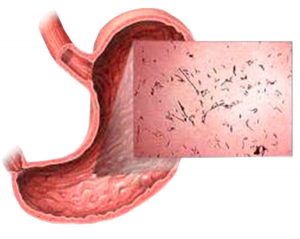 Infectious lesions of the intestine are accompanied by severe pain in the abdomen on the left.
Infectious lesions of the intestine are accompanied by severe pain in the abdomen on the left. Completely different infections can affect the intestines and cause irreparable harm to it. In the presence of an infectious disease, the patient experiences severe pain in the abdomen, diarrhea appears and there is a lack of strength. With the complication of the disease, the pain intensifies and is clearly felt on the left above the pubis. Blood and mucus can be found in the feces, and trips to the toilet become more frequent up to a dozen times a day, sometimes they are false. This condition is not uncommon in diseases such as dysentery,.
Intestinal dyskinesia
Under dyskinesia is meant a complex of ailments that occur with improper motor function of the intestine. In medicine, this disease is also called or spastic colitis. Dyskinesia occurs due to chronic stress, with negative emotions, lack of fiber-containing foods in the body. All this provokes insufficient intestinal motility, food accumulates and ferments. With this deviation, a person suffers from pain in the abdomen, he is worried about a feeling of fullness, constipation.
Intestinal microflora
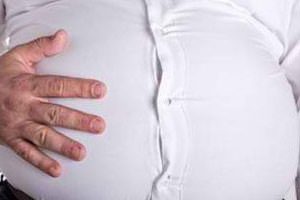 For dysbacteriosis, a characteristic feature is discomfort in the intestines.
For dysbacteriosis, a characteristic feature is discomfort in the intestines. Due to the incorrect composition of the intestinal microflora, a person often complains that his intestines hurt. In medicine, this deviation is called dysbacteriosis. At the same time, a person feels significant pain that spreads to the entire abdominal cavity, it can be quite sharp, he is tormented by a feeling of fullness in the abdomen, bloating and other pain symptoms. With often there is diarrhea, feces sometimes with green tint and has a fetid odor.
Crohn's disease and tumors
Crohn's disease also causes pain in the colon and along the digestive tract. This is a very serious disease, and if nothing is done about it, it can spread to the esophagus and stomach. Often the patient complains about:
- sharp pains in the abdomen;
- stool disorder;
- loud rumbling, with damage to the intestine on the right;
- intestinal obstruction in case of narrowing of the colon;
- increased gas formation and unpleasant belching.
Crohn's disease affects others internal organs especially the kidneys and liver.
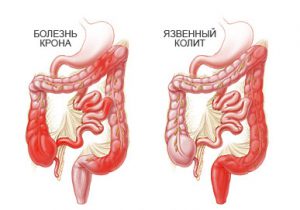 With a complication of the disease, powerful bleeding is possible.
With a complication of the disease, powerful bleeding is possible. Tumors can be benign and malignant. In the presence of a tumor, the patient can feel quite healthy for a long time. And only when the tumor increases, a number of acute problems appear immediately. First of all, a growing tumor compresses the intestinal tube, which leads to difficulty in the passage of food. There is intestinal obstruction, which is accompanied by constant constipation.
If a person feels that every day his stomach hurts more and more, this indicates a rapidly growing malignant tumor in the colon. Blood begins to be traced in the feces, which indicates an injury to the intestinal area due to the advancement of feces. When a malignant tumor disintegrates, an inflammatory process begins in the large intestine, which leads to internal bleeding. During this period, a person’s stomach does not hurt so much, he experiences more severe weakness, sometimes he loses consciousness right on the go. It is urgent to go to the surgical hospital.
What to do with pain?
If constipation is often tormented, but the pain is not particularly disturbing, perhaps the reason lies in malnutrition and the diet should be reviewed to include more foods that contain fiber. Pectin (oranges, grapefruits), which contains alimentary fiber. Don't forget about daily rate water. Its sufficient amount adds volume to the feces and contributes to their intensive promotion. With severe painful manifestations, it is necessary to forget about self-treatment and visit a specialist for diagnosis. The doctor will determine the nature of the pain and select the necessary treatment. With such ailments, analgesics, antispasmodics and anti-inflammatory drugs are prescribed to reduce pain.
Pain in the intestines is a very common complaint in pathologies of the gastrointestinal tract, and medicines for pain in the intestines will help relieve this symptom.
The main difference between pain in the intestines and pain in the stomach is the independence of the symptom from meals.
Most often, the most severely painful symptoms appear before the act of defecation, after which the patient noticeably feels better.
With lesions of some parts of the intestine, the patient may feel pain during defecation.
Causes and features of pain in the intestines
Colic does not last long and recurs from time to time, as for aching pains, they are usually persistent, incessant, and can intensify with exertion.
Pain is a sign of inflammatory processes in the intestine.
Doctors name many causes of pain:
- most often, the cause of sharp pain is the accumulation of gases in this organ, the phenomenon of obstruction of the organ as a result of the formation of nodes, tumor formations that stretch the intestine and damage it. In this case, the pain is usually aching, constant;
- sharp pains of a cramping nature in the intestinal area can indicate spasm of the organ, enteritis, food poisoning;
- adhesive disease, which is most often the result of an operation in the abdominal cavity, can also cause pain in the abdomen;
- if a sharp pain in the abdomen is accompanied by fever and an attack of vomiting, then this may indicate acute appendicitis.
If the patient has an intestinal ache, then first of all, doctors prescribe him a special balanced diet, which will help relieve some of the symptoms and strengthen the body weakened by the disease.
With constant stagnant processes in the intestines, some patients often use a laxative.
Doctors warn that such treatment should be used with great caution, only in isolated cases.
The constant use of such a medicine can lead to the fact that the intestines "get lazy" and stop fully processing food.
Therefore, to improve the process of food processing, it is best to use only natural, natural remedies.
Faster emptying of the intestines and processing food will help foods high in fiber.
Therefore, with pain in the stomach and lower abdomen, you should eat grain bread, baked potato, a small amount of strawberries and peas. Not superfluous will be porridge with bran.
It is very important for pain in the stomach and lower abdomen to establish the patient's drinking regimen.
The liquid helps to soften food and speed up its movement through the intestines, while the volume of emptying is noticeably increased.
You need to drink about 8 glasses of pure water per day. It is important to know that food should not be washed down with water.
Caffeine for pain in the intestines is undesirable. You should give up not only coffee, but also tea, coca-cola, chocolate drinks.
If it hurts in the stomach and lower abdomen, then the menu should not contain milk and products from it, as well as wheat.
These products further irritate the affected organ and negatively affect the entire body. When buying ready-made foods, make sure that wheat and milk are not in their composition.
The food in the diet should be homemade, street food and processed foods will aggravate the painful condition and bring a lot of harm.
When does pain occur in the gastrointestinal tract?
Abdominal pain can be felt in different places in the abdominal cavity.
It all depends on which part of the intestine requires medical attention:
- if a thin section of the intestine is affected, then the patient has pain in the navel area, and if the cause of pain is inflammation of appendicitis, then they are localized on the right, while at first they are felt from above, in the stomach area, and after a few hours they go down;
- if the pain on the right side is given to the right leg, then this also indicates inflammation of the appendix;
- in addition, the appearance of pain on the right side of the iliac region can signal typhlitis, as well as cancerous tumors in the intestine;
- if the patient claims that he has pain on the left side of the iliac region, then the doctor may suspect dysentery, obstruction, inflammation in the sigmoid region, ulcerative colitis of a nonspecific type, tumors in the descending and sigmoid colon;
- if the pains go to the sacrum, then this may signal a lesion of the large intestine, its left sections (dysentery);
- often patients complain of pain in the perineal region, which become even stronger during defecation, and are also accompanied by false urges. Such symptoms can indicate pathologies in the rectum - tumors, anal fissures, hemorrhoids, inflammatory processes;
- if it hurts before the defecation process, then doctors suspect pathologies of the colon and sigmoid colon, and pain during defecation can be associated with cracks in the anus, cancers, hemorrhoids;
- pain in the navel area speaks of inflammatory and oncological processes in the large and small intestine;
- if the patient has developed intestinal obstruction, then he is tormented by constant aching pains, which are supplemented from time to time by severe colic. It hurts in this case, usually around the navel or at the location of the large intestine, the sensations increase when the intestine contracts;
- in some situations, pain in the intestines and abdomen can even radiate to the chest region, which is why they are often mistaken for angina attacks.
Medications
If it hurts in the stomach and lower abdomen, then doctors recommend improving the functioning of organs with the help of enzyme preparations - Mezima, Festal.
Tablets will help to establish a chair, so they will be relevant for both constipation and loose stools.
Often the cause of pain in the stomach and lower abdomen is dysbacteriosis. Treatment in this case should remove unpleasant symptoms and restore the balance of microflora.
To date, there are pills that can simultaneously solve both of these problems.
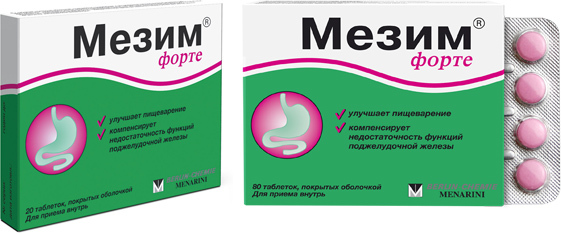
For example, doctors may prescribe Redugas, which restores the level of beneficial bacteria for digestion and removes discomfort in the stomach and gas from the intestines, due to which the tension of the intestine is noticeably reduced.
At the same time, the medicine prevents the development of bacteria that provoke the appearance of gases, as a result of which re-bloating of the organ does not occur.
The advantage of the drug is also that it is produced in the form of chewable capsules, so the treatment will also be convenient.
For acute intestinal colic in the lower abdomen and stomach, you need to take pills that relieve pain, for example, Baralgin or Analgin, as well as a remedy for inflammation - No-shpu or Papaverine.
Problems with the intestines can be manifested not only by colicky pains, but also by severe diarrhea, which brings a lot of inconvenience.
In such cases, the patient should always carry pills with him that will help solve this problem.
Treatment in such cases contains drugs Ftalazol or Sulgin, which not only remove this unpleasant symptom, but also have an antibacterial effect. In addition, Imodium will help to “fix” the chair.
Often the cause of intestinal colic and discomfort in the stomach and lower abdomen are stressful situations, so the patient needs not only to remove the symptoms of the disease, but also its cause.
In this case, the treatment is supplemented with drops of valerian or motherwort.
It should be remembered that self-treatment for pain in the intestines is very dangerous and can lead to undesirable consequences.
Therefore, before you start taking the medicine, you should consult a doctor who will determine the cause of colic and write out a list of effective ones in this case medical means.
where to do eco

